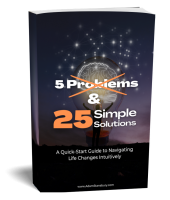Intuition is a fascinating and often misunderstood aspect of our human experience. It’s that gut feeling, that inner voice guiding us, and that inexplicable knowing that arises without logical reasoning.
Despite it being a natural phenomenon, there are several common myths surrounding intuition that can cloud our understanding of this powerful innate ability.
Let’s debunk seven of these myths and shed light on the truth behind intuition.
Myth 1: Intuition is purely based on luck or guesswork.
Truth: Intuition is not random or arbitrary. It’s a culmination of our subconscious knowledge, experiences, and insights that are synthesized and presented to us in the form of intuitive nudges. It’s a deep knowing that arises from a wellspring of accumulated wisdom.
Myth 2: Intuition is only for the “gifted” or psychic individuals.
Truth: Intuition is not limited to a select few. Every individual possesses the capacity for intuition. It’s an inherent part of being human. While some individuals may have developed their intuitive abilities more consciously or naturally, intuition is a universal gift available to all.
Myth 3: Intuition contradicts rational thinking and should be ignored.
Truth: Intuition and rational thinking are not mutually exclusive. In fact, they can complement each other. Intuition provides a valuable additional perspective that can enhance decision-making by considering subtle nuances, unseen possibilities, and gut-level feelings that logic alone may overlook.
Myth 4: Intuition is always right.
Truth: While intuition can be remarkably accurate, it is not infallible. Our intuition is influenced by our beliefs, biases, and emotional state, which can occasionally lead to misinterpretation. It’s important to balance intuitive insights with critical thinking and external information to make well-rounded decisions.
Myth 5: Intuition is a mystical or supernatural phenomenon.
Truth: Intuition is a natural and inherent aspect of our consciousness. It arises from the interconnectedness of our mind, body, and spirit. It’s not otherworldly but deeply rooted in our own being. Strong intuitive senses come from a deep understanding of yourself.
Myth 6: Intuition is a fleeting and ungraspable concept.
Truth: Intuition is not elusive; it’s a skill that can be cultivated and honed. By practicing mindfulness, developing self-awareness, and trusting our inner guidance, we can strengthen our intuitive abilities. Paying regular attention to and reflecting on our intuitive experiences helps us recognize and harness their wisdom.
Myth 7: Intuition is purely subjective and has no practical value.
Truth: Intuition is far from being solely subjective or impractical. Many successful leaders, innovators, and decision-makers attribute their achievements to intuitive insights. Intuition can guide us in various areas of life, such as relationships, career choices, and problem-solving. It can provide unique insights and help us navigate uncertainties with greater clarity.
Understanding the truth behind these common myths allows us to embrace and utilize our intuition more effectively. By acknowledging intuition as a valid, valuable, and natural resource, we open ourselves to a deeper level of self-trust and guidance.
Intuition empowers us to make decisions aligned with our authentic selves and to navigate the complexities of life with greater wisdom.
To harness the power of intuition, it’s essential to cultivate a sense of inner stillness, practice mindfulness, and engage in reflective practices.
By nurturing our connection with ourselves and trusting the intuitive nudges that arise, we can tap into the vast wellspring of wisdom within us.
Let go of the misconceptions, embrace the truth, and embark on a journey of intuitive exploration and self-discovery with my Free 14 Day Intuition Upgrade designed specifically for anyone looking for direction and a deeper understanding of their life purpose.
The next 14 day program begins Monday 3rd July for more information and to sign up visit https://adamstansbury.com/14dayintuitionupgrade







